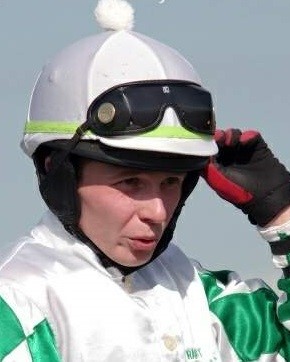May 2019 newsletter

Since we have - or used to have - a fairly hard and long winter in the Czech Republic, and we do not have any racing on all-weather tracks, our horseracing season does not begin until April, and it ends early in November. Owners and racing fans can deal with the situation quite well by having other interests in their lives for the winter months, but the long off-season is a problem for our professional trainers and riders.
The most enterprising and most successful trainers send horses to run abroad throughout the winter, or for the period before and after their training establishment is snowed in. Smaller trainers have a few horses to care for through the winter, but have limited income over the long winter months. They are happy if one or two promising new horses arrive, and if they have staff available to deal with their horses. It is all a bit precarious.
Our best jockeys go and ride abroad, or spend the winter abroad. The well-educated graduates of the Middle School for Horse Racing and Equestrianism located at Prague Velká Chuchle racecourse, which I normally refer to as the School for Apprentices, can quite easily find a job abroad. The world of horseracing is very open nowadays for talented and well-trained professionals with an EU passport. The big question for Czech horseracing is Will the jockeys and work riders who go abroad for the winter come back home when spring comes around? Or will they want to stay on? I have recently translated an interview which Martin Cáp took with Eliška Kubinová, who went to the USA as an au pair a decade ago, to get away from racehorses, and then …. http://www.dostihovy-svet.cz/en/node/8447.
Only one of our trainers had much success this winter with Czech-trained horses sent to run abroad, and that was Josef Váňa junior. He got a trainer’s licence in December 2018, and immediately took over 37 horses owned by Scuderia Aichner and previously trained by his father. These horses straightaway formed an excellent stable, and they have given Young Josef a flying start. Currently, he has trained 20 winners from 46 runners in Italy in 2019, at Treviso, Pisa and Milano. With good horses, several of them fully prepared, and with top jockeys Josef Bartoš and Jan Kratochvíl available to him, he can do no wrong. His father, Josef Váňa senior, has had a less than usually frantic time since Young Josef got his trainer’s licence. He has had a hip operation – I think it may be a reoperation on a hip replacement that he had some years ago. He says he is pain-free, but his doctor wants him to give the hip time to settle down.
Václav Luka has been sending horses to France all winter, but with little success so far. His horses often run in top handicaps in France, and the handicapper seems to have caught up with him! Only temporarily, we hope.
Czech-trained horses ran in Italy, France and Germany during the winter months. Just a couple of days ago, Jana Nováková sent a horse, Hádés, to Blommeröd, in southern Sweden, where he finished second. She has also had a winner at Milano, and two at Brno, already this year. Miroslav Nieslanik, in his third year as a trainer here, already has four winners on the flat before the end of April. Jan Verner leads the flat jockeys’ championship at the end of the month, with seven winners.
I have written on this website assuring whoever cares to read that, despite rumours that have spread far and wide, the 2019 Velka Pardubicka is not under threat. Firstly, although the search for a new main sponsor for the big race is still ongoing, there is no doubt that sponsorship money will be found. Secondly, although the finishing straight at Pardubice racecourse is not yet in perfect order after having a skating rink set up on it in the winter months, it will be usable for the opening meeting at Pardubice on May 8th. On the second Sunday in October, it will surely be in good order for the Velka Pardubicka. A commission made a preliminary inspection before the end of April, and the members congratulated Jiří Janda and his team on their good work on the track since the removal of the ice rink. There will be a further inspection before May 8th. No doubt the jockeys will be sdvised to be a bit careful, but that will be all. According to a Pardubice racecourse press release, jockey Jaroslav Myška rode a horse down the finishing straight before the end of April, and pronounced the course OK
April was cool and dry, though we did have a much needed very wet day on April 29th. May is the month for the Guineas classic races. I always complain that the classic races come too early in the season. The One Thousand Guineas is on May 5th, at Most, and the Two Thousand Guineas is at Prague Velka Chuchle on May 11th. I know it is a tradition to hold these major races before spring has properly arrived in the Czech lands – I would not mind if we had a real championship race for 3-y-os, or for all ages, later in the year, over one mile. Most of the runners in the May classic races will still be quite inexperienced, immature, and not ready to show off their talent.
May 1st is the traditional day for the first major race of our steeplechasing season, at Lysá-nad-Labem. The Category I First of May Steeplechase has attracted quite a good field, including Delight My Fire and Pareto. On May 8th, there is a meeting at Pardubice.
Betino is still waiting for the renewal of its licence to accept bets at our racecourses, which I have written about in some detail on these pages. It is strange not to have on-course betting. I find that it makes Category V and Category IV races even less interesting than usual.
May should be a mild and pleasant month for horseracing, and I hope it will bring pleasant afternoons at the Czech racecourses.
***
photo. Jan Verner, leading the Czech jockeys' championship on the flat at the end of April. photo by Petr Guth.
